Originally broadcast in 2008 as part of Doctor Who’s fourth season, “The Doctor’s Daughter” arrived with considerable anticipation. This episode, penned by Stephen Greenhorn, dared to introduce a genetically engineered daughter for the Doctor, a concept ripe with potential for character development and exploration of the Time Lord’s complex persona. However, despite its lofty ambitions and intriguing premise, “The Doctor’s Daughter” is often regarded as a stumble in what was otherwise a stellar season for the Tenth Doctor, played by David Tennant, during Russell T. Davies’ tenure as showrunner.
“Not what you’d call a natural parent, are you?”
“They stole a tissue sample at gunpoint and processed it. It’s not what I call natural parenting.”
“Rubbish. My friend Nerys fathered twins with a turkey baster. Don’t bother her.”
“You can’t extrapolate a relationship from a biological accident.”
“Er, Child Support Agency can.”
– Donna and the Doctor discussing parenting
As the dialogue above hints, the episode immediately grapples with themes of parenthood and responsibility, thrusting the Doctor into an unfamiliar and uncomfortable role. While these thematic explorations are commendable, the execution within the episode’s 45-minute runtime feels rushed and underdeveloped, leaving many viewers and critics with a sense of unfulfilled potential. “The Doctor’s Daughter” isn’t a complete disaster, possessing moments of brilliance and insightful commentary, but ultimately, it’s weighed down by its own ambition and a sense of being overly compressed.
[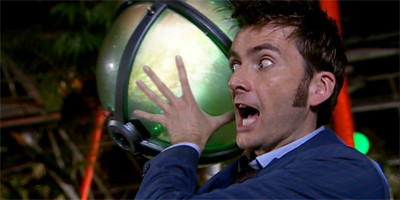 The Doctor contemplates the unfolding situation in "The Doctor's Daughter"
The Doctor contemplates the unfolding situation in "The Doctor's Daughter"
The genesis of “The Doctor’s Daughter,” as revealed in The Writer’s Tale, a compilation of emails between Russell T. Davies and Benjamin Cook detailing the production of Season 4, reveals a chaotic creative process that mirrors the episode’s somewhat disjointed feel. Davies, inspired by a comment about the Doctor’s unchanging nature, aimed to create a story where the Doctor would undergo significant personal change. This ambition, while laudable, immediately clashed with the structural necessities of a weekly episodic show like Doctor Who.
In his initial email outlining the episode, Davies envisioned a plot broadly similar to the final product, albeit initially set on an Earth colony. However, almost immediately after conceiving the idea of profound change for the Doctor, Davies acknowledged the story’s inherent limitations, stating, “She’s got to die at the end, of course.” This immediate negation of the central premise – a lasting change in the Doctor’s life – highlights the fundamental tension at the heart of “The Doctor’s Daughter.” The episode’s core concept was fighting against the established formula of Doctor Who from its inception.
[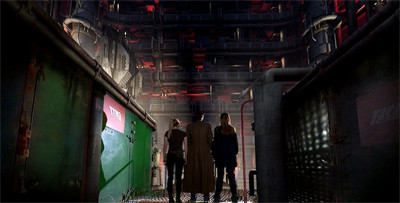 The Doctor and Donna face a crucial decision in "The Doctor's Daughter"
The Doctor and Donna face a crucial decision in "The Doctor's Daughter"
Further complicating matters was the pre-existing narrative arc for Martha Jones’s return. Davies had previously committed to Freema Agyeman, Martha’s actress, that episode 4.6 would be the “Martha Trapped in Space” episode, where she rejoins the Doctor. This constraint forced the inclusion of a Martha subplot that often feels awkwardly integrated, diverting attention from the central narrative concerning the Doctor and his newly created daughter, Jenny.
[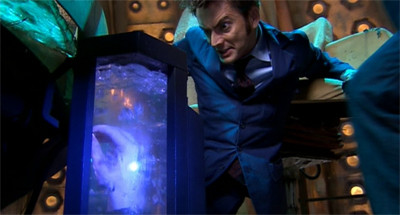 The Doctor and Martha find themselves in a precarious situation in "The Doctor's Daughter"
The Doctor and Martha find themselves in a precarious situation in "The Doctor's Daughter"
The episode struggles to balance its numerous elements: the introduction of Jenny, the ongoing war between humans and Hath on the planet Messaline, Martha’s separate adventure, and the underlying themes of pacifism and genetic engineering. It feels as though “The Doctor’s Daughter” is straining to achieve too much within its allocated time, resulting in a rushed and somewhat superficial exploration of its potentially rich ideas.
One of the most significant criticisms leveled against “The Doctor’s Daughter” is the underdeveloped nature of Jenny’s character arc. Born into existence as a fully formed adult with accelerated Time Lord DNA, Jenny is thrust into a war zone and expected to grapple with her identity and relationship to the Doctor within a matter of hours. Her dialogue often resorts to bluntly stating the episode’s subtext, such as “I have a body, I have a mind, I have independent thought. How am I not real? What makes you better than me?” While these are valid and profound questions, their delivery feels rushed and lacks the nuanced exploration they deserve due to the episode’s pacing.
[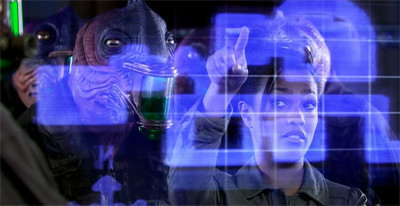 Jenny and the Doctor share a moment amidst the chaos in "The Doctor's Daughter"
Jenny and the Doctor share a moment amidst the chaos in "The Doctor's Daughter"
Furthermore, the Hath, the reptilian alien race at war with humanity, remain largely undefined. Their motivations and culture are scarcely explored, reducing them to antagonists in a generic conflict. Similarly, the central twist concerning “the Source” – the supposed life-giving artifact at the heart of the conflict – lacks sufficient foreshadowing, diminishing its impact when revealed to be merely a laboratory-created evolutionary accelerant. These underdeveloped elements contribute to the feeling that “The Doctor’s Daughter,” while brimming with concepts, fails to fully realize their potential due to time constraints and script limitations.
Martha Jones’s role in “The Doctor’s Daughter” is another point of contention. While Freema Agyeman delivers a solid performance, Martha’s subplot feels largely disconnected from the main narrative. She is relegated to running through quarries with a non-English speaking character, seemingly stumbling into the climax by chance. This separation from the Doctor and Donna, coupled with her isolated adventure, underscores a recurring issue throughout Martha’s tenure: her character often feels underserved compared to her predecessors and contemporaries.
[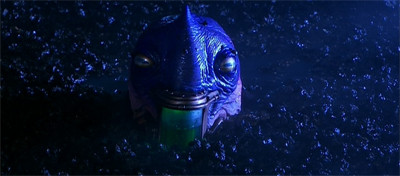 Martha Jones navigates the war-torn landscape in "The Doctor's Daughter"
Martha Jones navigates the war-torn landscape in "The Doctor's Daughter"
In many ways, Martha’s portrayal in this episode unfortunately reverts her to a more traditional, “classic” companion archetype – capable and resourceful, yet lacking the depth and agency afforded to Rose Tyler and Donna Noble in the revived series. While Rose served as the Doctor’s emotional anchor and Donna acted as his intellectual equal and challenger, Martha often felt relegated to a more reactive and less central role in the narrative. Her guest appearance in “The Doctor’s Daughter,” while intended as a welcome return, ultimately highlights this underdevelopment, making her inclusion feel somewhat gratuitous.
[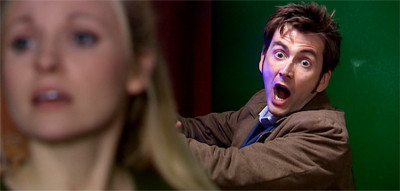 The Doctor and Donna have a serious conversation in "The Doctor's Daughter"
The Doctor and Donna have a serious conversation in "The Doctor's Daughter"
Despite its flaws, “The Doctor’s Daughter” is not devoid of merit. David Tennant delivers a compelling performance, navigating the Doctor’s discomfort and eventual paternal affection with nuance. The episode also grapples with significant thematic questions, albeit somewhat clumsily. The exploration of parenthood, thrust upon the Doctor in such an unconventional manner, sparks interesting reflections on his own past and his capacity for familial connection. The episode briefly flirts with the idea of the Doctor having to truly confront the responsibilities of fatherhood, even if this arc is ultimately curtailed by Jenny’s apparent death.
[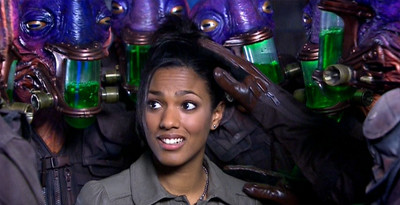 A moment of connection between the Doctor and Jenny in "The Doctor's Daughter"
A moment of connection between the Doctor and Jenny in "The Doctor's Daughter"
Furthermore, “The Doctor’s Daughter” touches upon the recurring tension between the Doctor’s pacifist ideals and his inherent capacity for violence. Jenny, as a genetically engineered soldier, embodies this conflict, forcing the Doctor to confront the soldier-like aspects of his own nature. Her observation, “You keep insisting you’re not a soldier, but look at you, drawing up strategies like a proper general,” cuts to the core of the Doctor’s complex and often contradictory character. This exploration, while not fully developed, adds a layer of thematic depth to an otherwise uneven episode.
[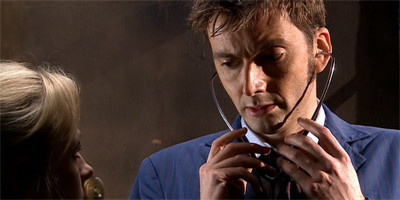 Donna attempts to mediate a tense situation in "The Doctor's Daughter"
Donna attempts to mediate a tense situation in "The Doctor's Daughter"
The episode’s attempt to evoke the tone of the Douglas Adams/Graham Williams era of classic Doctor Who is also noteworthy. The quirky high concepts, the blend of science fiction and surreal comedy, and the slightly uneven execution all echo this period of the show’s history. While “The Doctor’s Daughter” doesn’t reach the heights of episodes like “City of Death” from that era, it shares a similar ambition to tackle grand ideas with a slightly whimsical and sometimes flawed approach.
[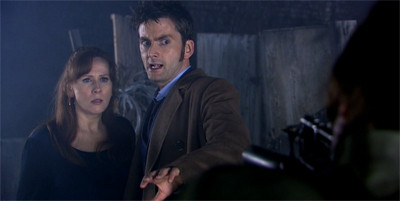 The Doctor expresses his disapproval in "The Doctor's Daughter"
The Doctor expresses his disapproval in "The Doctor's Daughter"
The resolution involving a time paradox, while feeling somewhat convenient, adds a classic Doctor Who element to the narrative. The explanation for the TARDIS’s arrival and Jenny’s creation, while perhaps a bit too neatly tied up, is reminiscent of the show’s penchant for timey-wimey complexities. However, in this instance, the paradox feels more like a plot device to resolve the over-complicated narrative rather than a genuinely integral part of the story.
[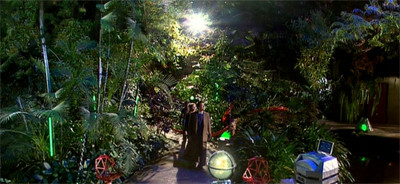 The Hath, a species at war in "The Doctor's Daughter"
The Hath, a species at war in "The Doctor's Daughter"
The concluding moments of “The Doctor’s Daughter,” where Jenny is seemingly killed and then inexplicably revives and departs in a spaceship, further contribute to the episode’s unevenness. While Steven Moffat, the incoming showrunner, reportedly requested Jenny’s survival, this last-minute resurrection feels tacked on and undermines the emotional weight of her initial sacrifice. The Doctor’s unawareness of Jenny’s survival also prevents any meaningful exploration of their father-daughter dynamic beyond this single episode, leaving a lingering sense of missed opportunity.
[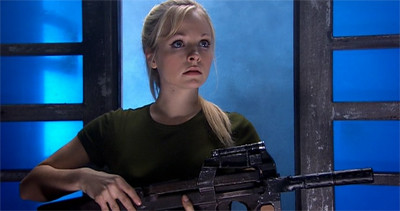 The Doctor's paternal instincts are briefly awakened in "The Doctor's Daughter"
The Doctor's paternal instincts are briefly awakened in "The Doctor's Daughter"
In conclusion, “The Doctor’s Daughter” is an ambitious but ultimately flawed episode of Doctor Who. Its rushed pacing, underdeveloped characters, and somewhat convoluted plot prevent it from fully realizing its intriguing premise and thematic potential. While David Tennant’s performance and certain conceptual elements offer redeeming qualities, the episode ultimately feels like a missed opportunity, a “speed bump” in an otherwise strong season. It stands as a testament to the challenges of balancing ambitious storytelling within the constraints of episodic television and serves as a reminder that even with the best intentions, not every experiment in Doctor Who can achieve its full potential.
[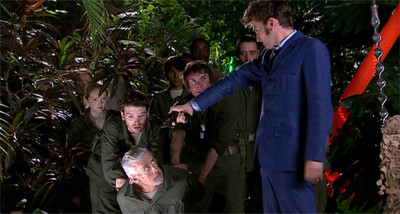 The Doctor is clearly frustrated and conflicted in "The Doctor's Daughter"
The Doctor is clearly frustrated and conflicted in "The Doctor's Daughter"
[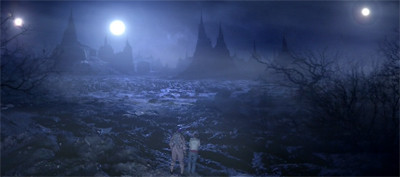 Jenny expresses her doubts and questions in "The Doctor's Daughter"
Jenny expresses her doubts and questions in "The Doctor's Daughter"
[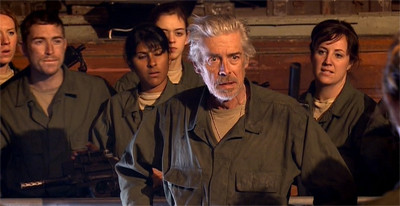 A moment of tentative cooperation in "The Doctor's Daughter"
A moment of tentative cooperation in "The Doctor's Daughter"
[ A scene of tension and conflict in "The Doctor's Daughter"
A scene of tension and conflict in "The Doctor's Daughter"
[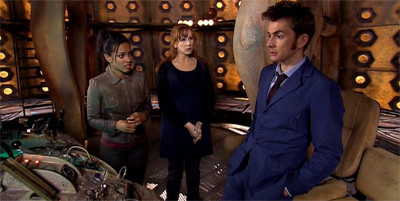 The Doctor and Donna seemingly agree to move on in "The Doctor's Daughter"
The Doctor and Donna seemingly agree to move on in "The Doctor's Daughter"
You might be interested in our other reviews from David Tennant’s third season of Doctor Who:

